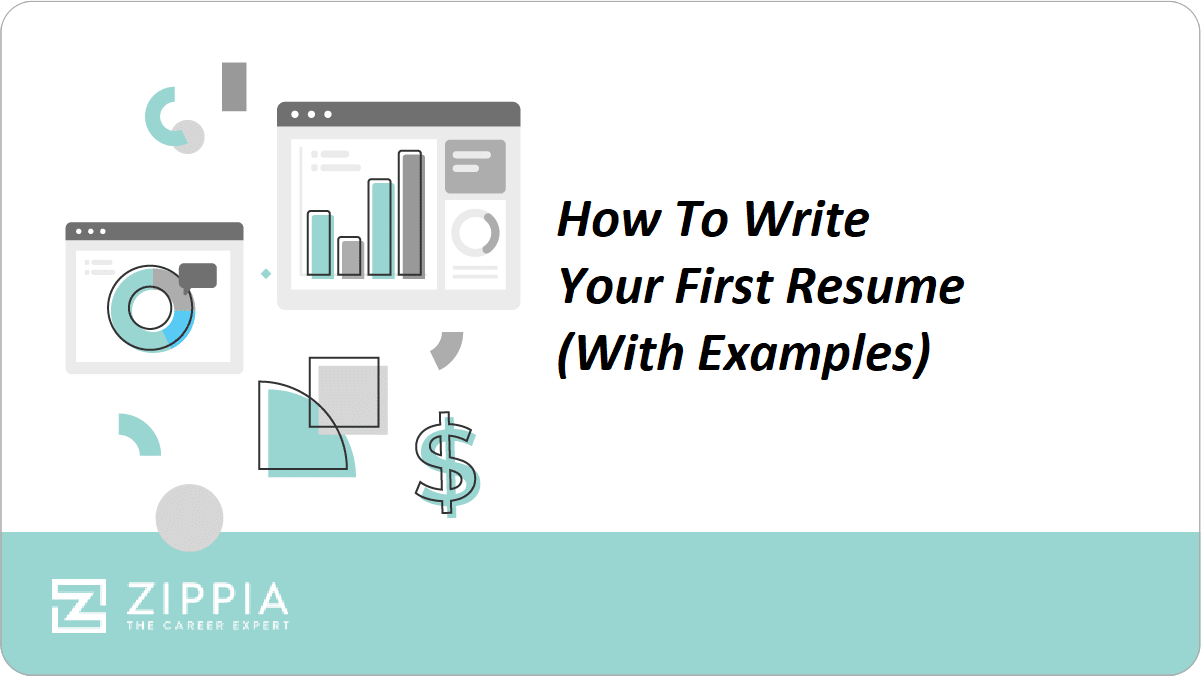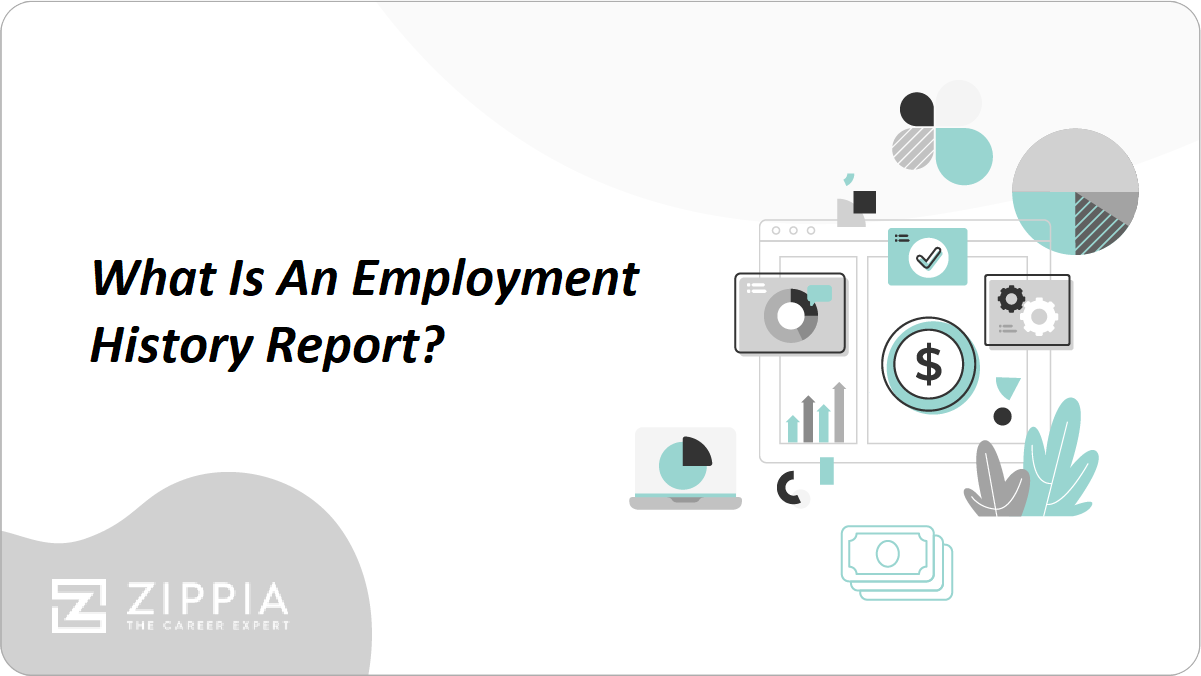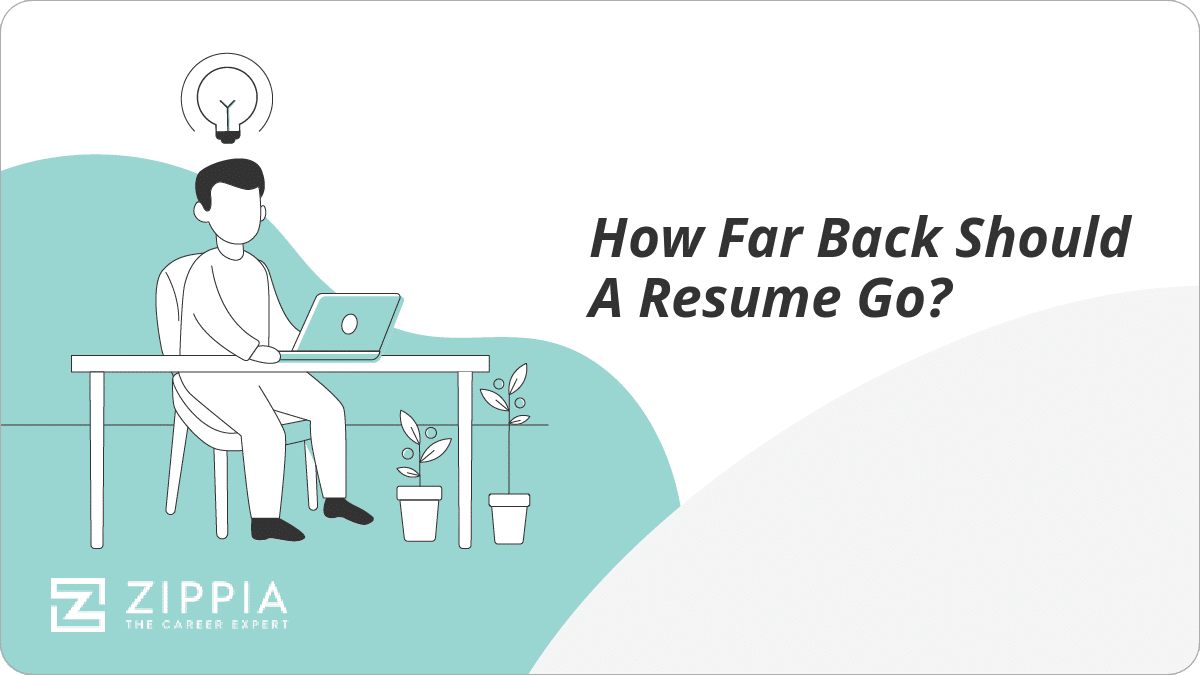You’re starting to look for your first “real” job, which means it’s time to write your first resume.
If you’ve never had a full-time job remotely similar to the one you’re applying for, it can be difficult to know where to start when listing your qualifications.
You’ve gained many valuable skills through your schoolwork and other jobs, though, which is worth talking about. You just need to know how to talk about it in a way that sells those skills to a potential employer.
Key Takeaways:
-
The sections that you should include in your resume are:
-
Contact information
-
Objective statement/summary
-
Work experience
-
Education
-
Skills
-
-
Keep your resume to one page.
-
Tailoring your resume and adding job specific keywords are a great way for your resume to stand out from other candidates.

What To Do Before Writing Your Resume
Before you begin writing your resume, make a list of keywords and skills that employers in your field are looking for.
You can do this by reading through the job description you’re applying for. If you aren’t ready to start down that road yet, you can also read through multiple job descriptions within the same industry and look for common keywords.
It’s important to include these keywords in your resume, because many companies use applicant tracking systems (ATS) to screen applications. These programs will scan your documents for keywords and let your resume through to human eyes only if they find what they’re looking for.
Because of this, you should always tailor your resume for each specific position you apply for.
What to Include In Your Resume
Chances are you’re not going into writing your first resume with a lot of professional experience under your belt. That’s not a problem, though, as long as you structure your resume accordingly by following these steps:
-
Add your personal information. Your name and contact information should be prominently featured at the top of your resume. Include your email address, phone number, and physical address so that it’s easy for hiring managers to get a hold of you.
-
Open with an objective statement. Your objective statement should highlight the top two or three features about you that you really want recruiters to see, as well as share a brief overview of your professional goals.
Even though this should be one of the first sections of your resume, it might be easiest to write it last, after you’ve pinpointed the skills and qualifications you want to include on your resume.
-
Highlight your relevant experience. Even if you don’t have any professional experience in the field you’re entering, that doesn’t mean you don’t have any relevant experience that you can add to your resume.
Start by going point by point through the job description you’re applying for (or one that looks interesting to you if you aren’t applying yet) and think through times you’ve used the skills they list.
Consider your volunteer work, your on-campus job, the clubs and organizations you were involved with, or other experiences you’ve had.
For example, if you are applying for a position that requires a lot of organizational and interpersonal skills, you could highlight your abilities in this area like this:
Experience
Volunteering
2014-Present
Chicago, IL-
Coordinated community garage sale that raised $5,000 for local food pantry
-
Tutored three elementary school students in English classes and helped them raise their grades by 5% each
-
Spoke to local high school swim team about dedication and teamwork
Student Assistant
2014-15
Chicago, IL-
Managed student appointments for three professors
-
Implemented calendar sharing system for professors and their assistants
-
-
Feature your education. If you’re a current student or have recently graduated, one of your greatest assets is your education. As such, you should put it on your resume.
Don’t just list the name of your school and your major, though. Also include any relevant classes, clubs, and study abroad opportunities, and mention any honors or certifications you’ve received. If you have a stellar GPA or graduated with honors, consider mentioning that as well, as these can help you further impress hiring managers.
For example, your education section could look something like this:
Education
Bachelor of Science in Mechanical Engineering
University of Colorado
May 2020
Summa Cum LaudeRelevant Coursework:
-
Physics 3
-
Statics and Dynamics
-
Heat and Thermodynamics
-
Engineering Management
Activities and Achievements:
-
-
Mention your specific skills. In addition to your work experience, you’ll also want to share what relevant skills you have. These can be anything from your proficiency in a particular software to speaking a foreign language.
Even though the job description may not be asking for someone who knows how to use Photoshop or speaks conversational Spanish, including skills like these shows that you have a lot to bring to the table. It also proves that you’re a well-rounded, hard-working individual, which organizations value.
If your skills section is looking a little thin, feel free to also list the soft skills from your experience section. Just make sure you can back each of these up with specific stories and examples, because you will be asked about them during an interview.
If you’re certified in a skill, be sure to include that as well.
The skills section of a resume with the experience section from the previous example may look like this:
Skills
-
Proficient in Microsoft Word, Excel, and Outlook
-
Spanish (conversational)
-
Javascript (basic)
-
Adobe Photoshop (intermediate)
-
Communication
-
Organization
-
Teamwork
-
Leadership
-
-
Hobbies and interests (optional). If you’re struggling to fill your resume and know that you’d fit in great with the company you’re applying for, you should consider including some of the hobbies and interests that you know the company would appreciate.
Even if you don’t know much about the company’s culture, listing some of your hobbies shows that you can take on a variety of tasks and responsibilities. Plus, it helps them see that you’re a fun person to be around.
Choose the hobbies you list wisely, though. Saying that you like partying on the weekends will raise some red flags, but sharing that you play a sport and like to read demonstrates that you’re disciplined and love to learn.
Example Resume
John Smith | New York, NY 12789 | (732)-235-3454 | JSmith@gmail.com | linkedin.com/John Smith SUMMARY
Dedicated digital marketing professional with over four years in the marketing industry. Highly proficient in marketing automation systems, digital campaigns, SEO, SEM, and website building.WORK EXPERIENCE
Volunteering
2014-Present
Chicago, IL
- Coordinated community garage sale that raised $5,000 for local food pantry
- Tutored three elementary school students in English classes and helped them raise their grades by 5% each
- Spoke to local high school swim team about dedication and teamwork
Student Assistant
2016-18
Chicago, IL
- Managed student appointments for three professors
- Implemented calendar sharing system for professors and their assistants
EDUCATION
Bachelor of Science in Mechanical Engineering
University of Colorado
May 2020
Summa Cum LaudeRelevant Coursework:
- Physics 3
- Statics and Dynamics
- Heat and Thermodynamics
- Engineering Management
Activities and Achievements:
- Led five-person team to win the schoolwide senior project competition
- Dean’s list all semesters
- President of engineering club
ADDITIONAL SKILLS
- Proficient in Microsoft Word, Excel, and Outlook
- Spanish (conversational)
- Javascript (basic)
- Adobe Photoshop (intermediate)
- Communication
- Organization
- Teamwork
- Leadership
What Not To Include in a Resume
While it can be tempting to stuff your resume as full as possible to make it look more impressive, there are some things you should still leave out.
-
Irrelevant experience. Not all of your experience is going to help you get every job you apply for. While your stint working as a lab assistant might have been applicable when you were originally a chemistry major, it probably won’t give you any points when you’re applying for an entry-level marketing job.
Now, if the job you’re applying for requires organizational skills, you might talk about how you coordinated your class schedule with the lab schedule to make sure you had everything set up on time. That would be considered relevant experience for that soft skill.
This goes for your skills, achievements, and hobbies as well: Your first place win in your local acting competition, while impressive, probably isn’t relevant to the student recruiter position you’re applying for. It’s best to leave it off and focus on the applicable achievements you do have.
Even if your resume feels short without these added details, leaving them off can help your most valuable qualifications shine through clearly instead of being muddied by irrelevant experiences.
-
White lies. Another tempting way to fill up your resume is to stretch the truth about your experiences and skills. While you do want to word your accomplishments so that the readers understand what you truly achieved and learned, you don’t want to get caught in the trap of making things sound more impressive than they are.
These white lies may seem harmless, but hiring managers are used to picking up on them and will purposely ask questions in an interview to see if you’re telling the truth.
To avoid this embarrassing scenario, only list skills and experiences that you know you can back up with a story or in a skills test.If you’re lacking a qualification and are asked about it, be honest and say that you don’t know, but that you will learn how to do it. This is a great opportunity to demonstrate that you know how to teach yourself new tasks and skills.
-
Work samples and references. While many recruiters want to see these documents, they don’t want them on your resume. Wait until they ask to see them, or include them as separate documents if they’re required with your application.
-
Fluff words. You don’t want to add too many fluff words or buzzwords just to impress your employer. It just makes it harder for your employer to understand what you have to bring to the table.
How To Choose the Perfect Template for Your Resume
You might have noticed that there is no shortage of free resume templates on the internet. These can cut your work in half when creating a resume, so take advantage of them.
When you’re choosing one to use, keep these factors in mind:
-
Page length. Choose a template that will allow you to keep your resume to one page. This might be all too easy right now, but once you start getting some more professional experience to add to your resume, it will become more difficult.
Save yourself from having to choose a new template every time you add something to your resume by finding one that gives you room to grow.
-
White space. Similar to the last point, make sure your template has plenty of white space (areas without any text or graphics in them). No one wants to read a document that is solid text, and even if they do read it, it’ll be difficult to understand.
Instead, design your resume so that it’s scannable and has room to breathe. You should be able to easily tell when one section ends and when a new one begins.
If your template’s graphics are causing your content to be too crammed, it might be time to go for a simpler design.
-
Font. The point of your resume is to be readable, so choose a template with a clean, professional font. This also means that it shouldn’t be too small to read.
Stick to one to two fonts for your whole resume, and if you do choose a second one, make sure it serves a purpose and is clearly different from your first one. Mixing serif and sans serif fonts, for example, is a great way to do this.
Some fonts to stick to are:
-
Arial
-
Calibri
-
Helvetica
-
-
Design. When choosing a template, strike the balance between visually appealing and still appropriate for your industry.
A resume for a graphic designer, for instance, should look different than one for an accountant. Choose a design that reflects both your personality and your professional goals.
Resume Tips to Keep In Mind
-
Proofread. When you finish your resume, the final step is to proofread it. You want to make sure all the information you have down is correct and error free. This include spelling and grammar mistakes. It can look unprofessional if a hiring manger picks up your resume and there’s just mistake after mistake.
-
Tailor your resume. You should be tailoring your resume to each job that you apply to. If some of your work experience doesn’t relate to the job that you are applying for, you don’t need to include it. Having unnecessary information just takes up space.
-
Use keywords. The best way to get an employers attention is to use keywords. You can find them in a job description or on a company’s website. Try to match the keywords to your skills and experience.
-
Quantify when possible. Being as specific as possible can help a hiring manager know who you are. Instead of saying something like “has a lot of experience” try saying “has five years of experience.” Using accurate numbers and dates can help improve the quality of your resume.
-
Use bullet points instead of paragraphs. This is a great way to save space on your resume. You should keep it to three to four bullet points for each section, and no more than two lines of text. Bullet points can make it easier for a hiring manager to read your skills and qualifications faster.







